There is a practical reason to own a car like this 1965 Morgan +4 Drophead, especially if you are the sort of person who is “hands-on” with their classics. Unlike so many vehicles, the Morgan is hand-built. The company doesn’t rely on traditional production lines or robots to assemble their cars. That means that every component is attached to the vehicle by human hands. If human hands can put the parts on, then human hands should easily remove them. For the owner, that means not having to wrestle with components that have been installed in inaccessible spots by machines. This +4 has been owned by the same family since new, but the time has come for the classic British sports car to head to a new home. It isn’t perfect, but it is a clean and tidy survivor that can be driven and enjoyed immediately. It is located in Saratoga, California, and has been listed for sale here on craigslist. The sale price for this beauty has been set at $38,000.
The owner’s parents must have really wanted to own a +4 because they traveled to England in 1965 to take delivery of this vehicle personally. Once it arrived in the USA, it appears that it has spent its entire life in California. This should have helped it remain rust-free, and the owner doesn’t mention any problems in this area. The vehicle is finished in Black, which raises an interesting point about Morgan cars of this era. The company only offered five different colors on the +4 in this model year, and none of them were Black. However, the fact that these were hand-built meant that the company was happy to finish the car in any shade that the buyer desired. That would appear to be the case with this little Morgan. The paint presents well for an original survivor and only has a few minor flaws and cracks. The convertible top appears to be in good order, as does all of the glass. The trim and chrome, including the luggage rack, all shine nicely. I can’t spot any problems with the wire wheels, and it is a bonus that the owner is including an extra full set of five wheels in the sale.
During the +4’s initial production run from 1950 until 1969, several engines found their way under the hood. From the 1962 model year, the standard engine was the 2,138cc 4-cylinder engine that also saw duty in the Triumph TR4. This engine pumps out 105hp, which is fed to the rear wheels via a 4-speed manual transmission. As is often the case with classic British sports cars from this era, that figure doesn’t appear terribly impressive. However, a +4 tipped the scales at a mere 1,950lbs. That allowed the vehicle to cover the ¼ mile in 17 seconds. The owner states that the Morgan is showing 61,000 miles on the odometer, but doesn’t mention whether he holds evidence confirming these miles to be original. The vehicle runs and drives, but the owner has been told that it needs a new front spring. It is the mechanical health of the Morgan that brings a sad twist into this classic’s story. The vehicle spent more than a year in the hands of Bill Fink, who ensured that the car was in sound mechanical health. Mr. Fink was a legend in US Morgan circles and could work on these cars with his eyes closed. Tragically, Mr. Fink lost his life in a house fire earlier this year. His loss is one that will undoubtedly be felt by the wider Morgan community for years to come. This car represents one of the last that would have received the touches of this Morgan maestro.
Some aspects of the Morgan’s interior are looking slightly tired, but there is no reason why it couldn’t continue to be used as an original survivor for many years to come. I can spot what appears to be a single seam separation beginning to appear in the driver’s seat, but the rest of the leather is free from rips and tears. The covers look a bit on the stretched side, and I think that the seat padding has compacted over the last 55-years. I don’t believe that a retrim is required. I feel that a good upholsterer should be able to refurbish or replace the padding, and then stretch the hand-stitched leather covers to fit.
While the seat upholstery will require attention, the timber trim wants for nothing. Morgan has always been renowned for its use of timber in car construction, and their craftsmen really know their stuff. The wood on the dash, the door caps, and the wheel, all present beautifully. There are no signs of any flaws or age problems with the finish. It simply has a warm satin glow to it. The center cluster appears to have no issues, and I love the fact that Morgan placed the most crucial gauge in a sports car, the tachometer, directly in the driver’s line of sight.
Between 1950 and 1969, Morgan produced 4,584 examples of the +4. That equates to less than 230 cars per year. Of these, a mere 433 were the Drophead version the same as this car. Today, they rate as one of the most popular and most desirable of the company’s models. Spotless examples can easily fetch prices of $45,000, although this figure can rise considerably for the right car. This one isn’t perfect, but it is a great survivor that has spent its entire life with one family. I can only hope that its next family loves it as much as this one does.
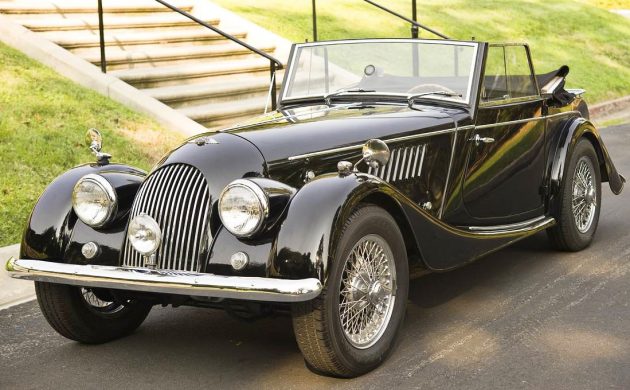
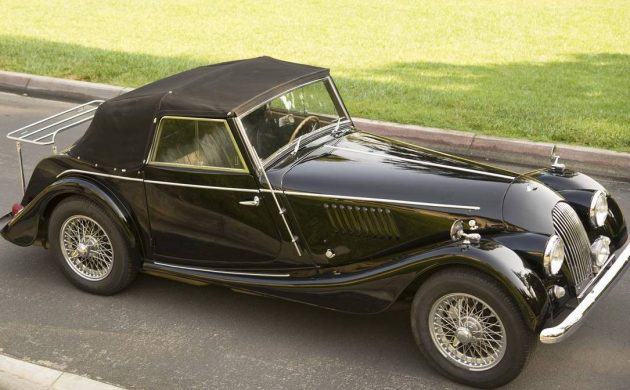
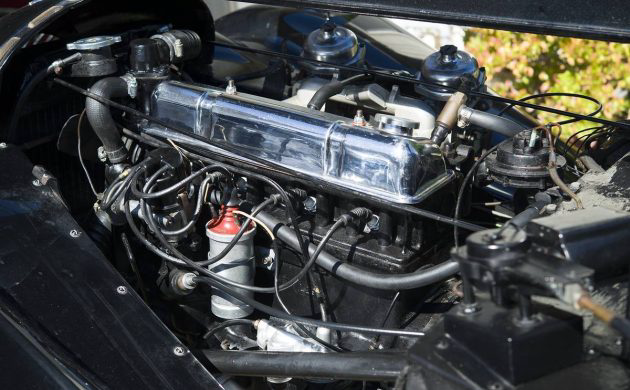
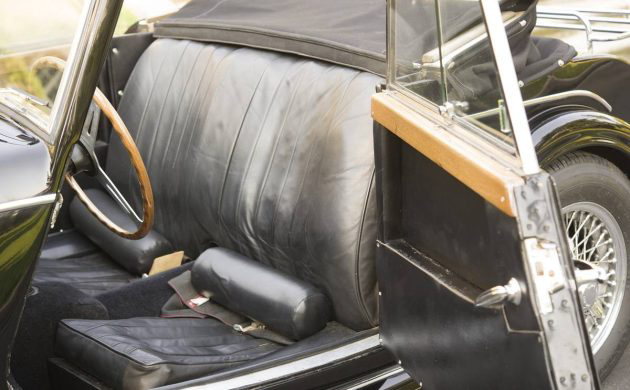
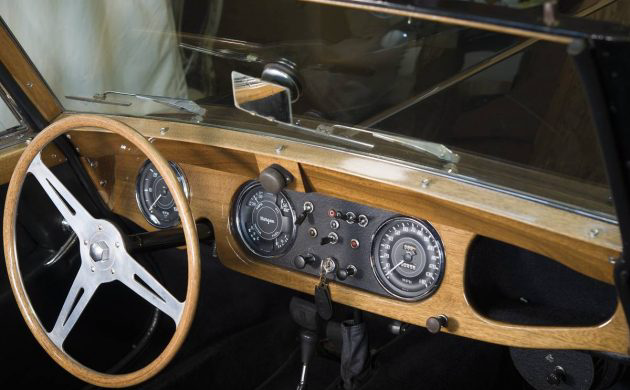
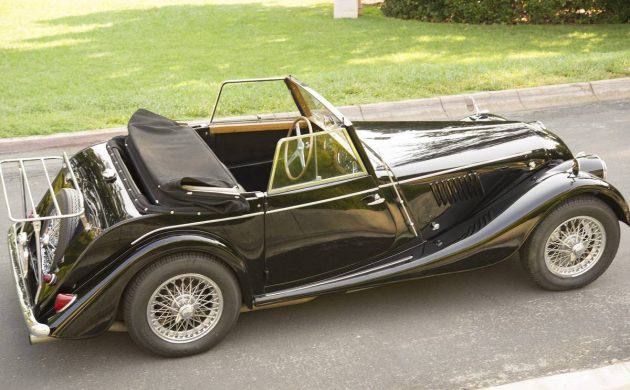




Nice car for just putting the top down and cruising the two lanes. Seems like a reasonable price .
I owned and enjoyed a black Morgan drop head like this for many years until a narrow bodied +8 came along and SWMBO declared that three Morgans was one to many. Mine, not this one btw, went back to the west coast from Massachusetts. If I were younger and had a larger garage, I’d be seriously considering this little beauty; this model is one of the best Morgans for cruising.
Wow what a nice car – no wonder the family kept it so long .
If you are contemplating the purchase of a used Morgan, or have already bought one, you owe it to yourself to go to England & head for Pickersleigh lane, Malvern Link, England, for one of their guided tours [by appointment only]. Tours are mostly still given by the current owner, Charles Morgan!
At Morgan, you will see first hand how automobiles were built during the first half of the 20th century, with a few modern touches thrown in by government decree! 10 cars are made per week, no more. Once you’ve owned a Morgan [at least one in good condition], you will likely regret selling it.
Hello we were so happy with our 1995 Morgan it was green with a leather belt
Over the hood loved to drive her in the Redlands northern calif
JR
interested at 22,000
I ordered a 1965 Drop Head in Black from the factory which was delivered in New York. I found the seating very uncomfortable until I discovered that, rather than normal padding, the seats came with an inflatable bladder and had to be blown up like a baloon. I loved the car and selling it was one of the biggest mistakes I ever made.
James,
You are referring to the famous [or infamous] Dunlop Rubber Co. seat cushion bladder, called the DunloPillow. These were used in many British cars, my Rolls-Royce 20/25 had them, as did my Rover 12, Morgan +4, Jowett, Jaguar Mk VII saloon, and probably others I can’t remember.
Having operated a restoration and repair shop specializing in upscale and unusual British vehicles, it was not uncommon for a car owner to bring their British car in for various repairs and ask if something can be done to improve the seat padding.
The first thing we would do is inflate the bladder, and if it needed fixing, we would treat it just like any other tire tube and apply a patch. Sometimes they were simply too far gone, but there was [probably still is] a company in England who supplied reproduction DunloPillow bladders.
The biggest problem with these bladders, is many car owners simply don’t know they exist!